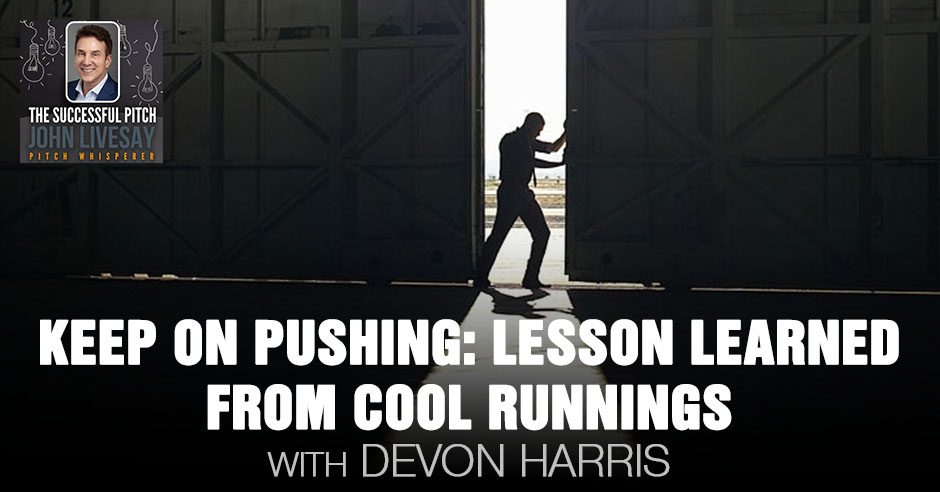Keep On Pushing: Lesson Learned From Cool Runnings With Devon Harris
Posted by John Livesay in podcast0 comments

Have you ever wondered what it would take to become an Olympic athlete? A member of the original Jamaican Bobsled Team, Cool Runnings, Devon Harris achieved his grand dream when he became a three-time Winter Olympian. Devon joins John Livesay as he taps in with the same energy, determination, and skill that enabled him to bobsled with the best in the world. Following his Olympic crash, Devon recalls how it was not all rainbows and butterflies for him and shares how he managed to emerge victorious from his misfortunes. As one of today’s sought after international motivational keynote speakers, Devon continues to inspire audiences to face adversities and get over life’s failures. Listen in as Devon sparks audiences of all ages to dream big and take their “game” to the next level.
—
Listen to the podcast here
Keep On Pushing: Lesson Learned From Cool Runnings With Devon Harris
Have you ever wondered what it would take to become an Olympic athlete, or what it would be like to have someone make a movie about your experience at the Olympics? In this episode’s guest, Devon Harris shares all of his secrets about how that happened for him. Enjoy the episode.
—
Welcome to the show. Our guest is Devon Harris, who was raised in the violent ghetto environment of Olympic Gardens in Kingston, Jamaica. The greatest gift he ever received was the belief that a positive attitude and a ‘never say die’ philosophy would carry him farther than a sense of injustice and a heart filled with anger. He graduated from the prestigious Royal Military Academy Sandhurst in England, received a Queen’s Commission in December 1985, and served in the Officer Core of the Jamaica Defense Force until December ‘92 when he retired as a captain.
He’s also an original member of the 1988 Jamaican bobsled team and was Captain of the ‘92 and ‘98 teams and a three-time Olympian. He achieved his grand dream and now, his dream is to inspire others to achieve theirs. He’s an international motivational keynote speaker. He taps the same energy, determination and skills that enabled him to bobsled with the best in the world to audiences of all ages and take their game to the next level. When he’s not speaking, he’s also writing books, including his one called Keep on Pushing: Hot Lessons from Cool Runnings.
—
Devon, welcome to the show.
Thank you so much for having me. How are you?
I’m great. I can already feel the energy coming through. It’s wonderful. What an amazing story you have of two separate careers from what I can see of an Olympian career and a military career. Let’s go back a little bit to where you get this concept that you weren’t going to let your circumstances define your mindset.
[bctt tweet=”People hesitate to make goals because of the fear of criticism or ridicule. ” username=”John_Livesay”]
Every time I’m asked that question or a version of this question, I blame my grandmother. It’s her fault. I spent my early years with her until I was maybe five. The thing I remember about her was that she was an amazing storyteller. Certainly, the ones that had the greatest impact on me were the ones she told me about soldiers and these amazing things they could do and not get hurt. That fired up my little five-year-old imagination and inspired me to want to become a soldier but more importantly, to want to do things that other people thought were impossible or difficult.
What a sweet legacy she left too. As a storytelling keynote speaker, when I hear somebody say that she or he told great stories, it always warms my heart because that’s the power of storytelling. Those emotional stories, in particular, make impressions on us and keep us memorable. Let’s talk a little bit about the concept of goal setting since it’s such a big part of what you do and the power of visualization. You decide whether you want to take us down your Olympic career path first or the military one. Where did you start learning how to start visualizing the outcomes you wanted?
We all grew up imagining things such as wanting to be a superhero like Superman, but I don’t think we realized at the time that we’re using the powers of our imagination. We’re visualizing. The successful ones are those who harness that power and use it in a very deliberate and focused way. Growing up in Jamaica, I wanted to go to high school because we had to pass an exam to get to high school. It’s so much a rite of passage. You dream about that, imagine it, and work towards that. For the first time, I can truly remember in a focused, deliberate way using imagination and visualization was when I ran track. I did not even know there was such a word called visualization, but I would visualize myself running and winning.
To be honest, there were a few races that I didn’t win, and I look back and realized that it was because I was nervously visualizing a result that I didn’t want and sometimes, whether as a salesperson, you go for an interview and you’re nervous because you’re visualizing an outcome you don’t want. Those things are self-fulfilling prophecies.
Let’s talk about goals a little bit. There are a lot of reasons that people resist setting goals. Do you feel that it’s because they’ve done it in the past and it hasn’t worked? Nobody wins an Olympic medal without having that be a goal. It’s not like, “I stumbled into this medal. I don’t know how it happened. I didn’t set any parameters or visualize it at all.” Yet so many people think, “I’m not going to go through my life like that in terms of my career or even my personal life.” What is it that you think causes people not to set a goal? Is it that fear of feeling worse off that they didn’t even try?

Cool Runnings: People who are able to tackle this fear of failure and ridicule develop really tough skin. If you laugh at them or tell them they can’t do something, it makes them more determined to do it.
The big F word or fear word is the thing that keeps people from not setting goals. One is the fear of failure. They’re like, “What if I don’t hit the goal? Maybe I shouldn’t set it because if I don’t hit this goal, I’m going to feel awful.” They don’t realize that by simply not setting goals, you have already accepted failure. They are afraid people might laugh at them and go, “What kind of ridiculous thing is that? What makes you think you can do it? You have to be ready for the fear of criticism and ridicule. Imagine four fools from Jamaica deciding they wanted to go to the Winter Olympics. People were like, “Are you kidding me?” People laugh but who’s laughing now? That’s the question.
I certainly have experienced the fear of failure myself. I had another guest on, Jay Samit, who said it’s just feedback. You keep going until you get a zombie idea that’s so great it won’t die but I’ve never had anybody come on and talk about the fear of being ridiculed. Let’s dive into that story. Take us back to 1988. You’re in Jamaica. To my knowledge, it doesn’t snow there and yet somehow, you and these friends of yours decided to compete in a sport that requires snow where other countries that get snow have a little bit of an advantage, if not a lot. How did that all come up? Whose idea was it? Where did it come from?
For the Cool Runnings fans, they’ll remember Sanka in the movie racing this wooden cart down the winding mountain road so it’s like bobsledding except for the ice to crease the guys going down the side of a mountain in a cart. These two American guys realized that a big part of a bobsled race as a start is you need sprinters, so they went to the guys at our summer team. They didn’t want to do it because it was a harebrained idea. They came to the Army looking for athletes and people who were either brave or foolish enough to try this thing. My colonel suggested that I try out for the team. To go back to the whole business of goals and dreams, I’ve always had Olympic aspirations, so there’s like, “It’s a little bit different. It’s not running but am I going to go to the Olympics? Yes. Let’s jump on the sled, as it were.” Honestly, even for myself, initially, it sounded like a ridiculous idea until it didn’t sound like a ridiculous idea. I was like, “I could ride this thing to the Olympics literally and figuratively.”
I’m sure when you were doing this, you never dreamed it would become a movie.
That’s just icing on the cake. That’s the thing that Hollywood stories are made of. We got started. Not only did we have to contend with a fear of failure because it was a steep learning curve but we also had to deal with the ridicule. It’s not just some from a couple of friends who were teasing us but people from all over the world and the stuff in the press. The thing with people who tackle this fear of failure and ridicule is that they develop thick and tough skin. I have an attitude whereby if you laugh at me or tell me I can’t do something, it makes me more determined to do it.
[bctt tweet=”Let go of the fear of failure.” username=”John_Livesay”]
Let’s talk about the movie for a while because a lot of people fantasize that, “They’re going to make a movie of my life. A particular part of my life is going to be in a movie. Who will play me?” Were you happy with the actor that portrayed you? What did you think about watching that movie back after the first time?
The thing is that the characters in the movie are different from real-life characters. If I had to choose one, I’d say it was Yul Brynner, the baldheaded guy played by Malik Yoba, but more so because he was a dreamer. He’s a dude that wanted to go to Buckingham Palace to live. How I see myself as well as a dreamer. I never dreamed of going to Buckingham Palace to live, but I’m a dreamer. Overall, I enjoyed the movie. I thought it was a good human interest story with some real positive life lessons. It wasn’t true to form and I get it. If they had told a story as it unfolded truly, people think that some of it are corny. Fact is stranger than fiction.
It’s the ultimate underdog story. Rocky is an underdog movie about boxing and this happens to be even more of a dichotomy. A lot of movies, because I love storytelling so much, are around fish out of the water. I can think of a more fish out of water genre than someone from Jamaica competing in a bobsled Olympic competition. That’s part of the reason why our brains are drawn in to say, “What in the world is going on here?” How did you transfer that skill and achievement into becoming a motivational keynote speaker?
As I was working to qualify and compete in my third Olympic games, I ended up working with a guy who wanted to be my agent. I’d never had an agent before. It sounded cool. He goes like, “You should be a motivational speaker.” I’m like, “I’ll do that after the Olympics.” I wish there was a far more strategic approach to this. I went to the Olympics, came back, started telling my story and people resonated with it. One of the things I’ve learned over the years is that success principles are universal. There is something about my life, about your life and about this person over here that’s reading this. Each of us has a story we can tell that is going to resonate with somebody else. Encourage them and inspire them. I started with no final plan. I just started telling my story and here we are having a conversation.
When people are having trouble, what do you think is making them stay motivated? A lot of us say, “I’m going to set this goal, hit this quota and sales. I’m going to lose weight,” or whatever their goals are, then they hit the first block and give up. Do you have a story of when you had some obstacle come along either while you were competing for the Olympics and/or in your military career?

Cool Runnings: Success principles are universal. Each person has a story he can tell that is going to resonate with somebody else and courage them and inspire them.
I’ll tell you a story, which is a giving up story. When I was in high school running, my goal was to win gold and nothing else. I didn’t want silver or bronze but gold, and then for some reason, I thought I was not going to win the gold. I was the one that jogged. Finishing fourth is worse because I didn’t want any medal that wasn’t a gold medal. I ended up in this race where it wasn’t going as well as I expected it to go, and I started jogging. I did horribly and learned a valuable lesson because I was striving for perfection, which is a problem in itself. Perfection is amazing because it does motivate us to work like a maniac, but the thing is that in the end, you can never know until you see this thing through how it will work and end up.
I look back at that particular race like, “I could have probably won that race if I had given my best.” That’s the lesson. It’s not perfection but excellence giving off your absolute best at the moment. That best that you’ll give may not be the greatest performance of all time but in the end, you can go, “At that moment on that day, that’s all I had and I gave it all.” On one level, I hated the fact that I had that experience, but I’m so grateful for it because it has made me even more determined and resolute. When I do meet those obstacles, setbacks and frustrations, it’s not like I don’t feel them inside, and I don’t get frustrated but I absorb the disappointment and come off swinging.
What you said there is key. A lot of people think that if you’re an Olympic champion or successful in whatever, that you’ve never had a disappointment or an obstacle but to hear from someone like you saying, “I had disappointments. I just absorbed them as opposed to letting them stop me,” that concept is almost like an energetic, “I’m going to take it in and then let it out.” It’s not, “I’m going to take it in and have it freeze me.”
I use a metaphor. First of all, recognize that we don’t live in a world where those things don’t exist. I wish we did. I’m sure you do too, but we don’t live in a world like that so you have to learn. If you have ever watched boxing or any other contact combat sport, it is rare unless you’re Mike Tyson, who knocks out a guy in the first nineteen seconds. You’re not going to go with 10 or 15 rounds without getting hit so the dude or the girl who ends up winning got some good clobbering along the way but they didn’t go, “That hurts. I’m done.” They absorbed the shock, punch and pain, then they come out swinging again and that’s what we have to do in life.
How did you become Captain of the Olympic team? Is that something that the team votes on? You had it happen twice, so you did something right.
[bctt tweet=”Fear is the thing that keeps people from setting goals. And by simply not setting goals, you have already accepted failure.” username=”John_Livesay”]
Interestingly enough, when I started on the team, three of us were Army guys. One was a private. I was a Lieutenant at the time, and the other guy was a Captain. When we were voting for Team Captain, it was obvious that the soldiers were going to vote for the Army Captain to be Team Captain and then, that dude ended up leaving the Army, and I became an Army Captain afterward but I was always there from the beginning. I always, as you can imagine, had the lead role on the team. By the leadership roles that I played in 1992, I was voted team captain.
Those lessons of being a Team Captain for an Olympic team transfer over to being a leader in the corporate world when you’re giving talks?
Yes. In the same way, success principles are universal. Leadership principles are universal. Maybe, the talk about talks, the first thing is communication. As a leader, you must be able to and when I say communicate, not just curable speech and vomit all over people with information. It’s about talking to them at their level and connecting with them.
Not asking anybody to do anything that you wouldn’t do or can’t do. Is that also a part of it?
At least unwilling to do, because I don’t think that the leader on any team is necessarily going to be the guy or the girl who can do everything or do it better than everybody else but if you are expecting the team to sacrifice a certain way, you better be willing to do it as well. You can’t expect and that’s coming from my Army days. You can’t say, “Private Jones, you go run over there and draw the fire,” if you’re not willing to do it yourself so you can’t have the boardroom and the company ask Mary to make certain sacrifices if you, as a leader, isn’t willing to make those sacrifices.

Cool Runnings: The first thing for a leader to learn is communication; it’s about talking to your team at their level and connecting them.
The other thing I find very impressive is in the 2018 Olympic games in Korea, you were inducted as an Olympian for Life by the World Olympians Association for your contribution to society. What did that feel like when you got that honor?
It was surprising because I’m an Olympian and I assumed that I was going to be an Olympian for life. It was very flattering. It’s a program that started in Rio, where they honored five Summer Olympians. The next time around was in Pyeongchang, where they honored 5 Winter Olympians, and I was among the first 5. It’s cool to be honored by your peers. That’s one of the most flattering things when your peers go, “Among all of us, you are one of those guys who deserve to be honored.”
Are you involved with deciding who else gets inducted? Is there a criterion for that?
No. They gave it to me like, “Run along. Keep doing what you’re doing.” They have a committee that has smarter minds than mine.
What’s next for you? Are you going to continue to give talks to companies? You’ve got this great book out. What are your goals for the next year or so?
[bctt tweet=”Instead of letting others’ criticisms knock you down, let it energize you to prove them wrong. ” username=”John_Livesay”]
To go back to why I got that award from the World Olympians Associations, giving back is important. My foundation, the Keep On Pushing Foundation’s goal is to provide practical solutions to some of the issues that are preventing kids in disadvantaged communities from getting properly educated. We’ve started working at my elementary school in my old neighborhood and a couple of other schools. We distribute school supplies, breakfast programs and computer labs trying to set a foundation that’s going to help them to compete in the 21st century.
If someone wants to reach out to you to hire you as a motivational keynote speaker, where should they go?
I tell people I’m the easiest guy to find. You’ll probably disagree but DevonHarris.com is my website. They can email me directly from there.
Is there any last thought or a quote that you want to leave us with?
I could modify a quote by Thomas Alva Edison who says, “Whatever lies before you and behind you is totally and completely insignificant to what lies inside of you.” Remember that.
[bctt tweet=”Whatever lies before you and behind you is totally and completely insignificant compared to what lies inside of you. ” username=”John_Livesay”]
Devon, thanks for sharing your incredible story of tenacity and grit and inspiring all of us a little bit more.
Thank you for having me and for having a program like this that’s putting such good work out in the world. I encourage your audience to continue to support that work and share it with everybody they know because it’s amazing.
Thanks. As a storytelling keynote speaker, I love hearing other people’s stories and sharing them with the world, so it’s a great platform to do that. Yours has certainly been one that I know people will come back to more than once.
Thank you. Stay well.
Important Links
- Devon Harris
- Keep on Pushing: Hot Lessons from Cool Runnings
- Jay Samit – Past episode
- Keep On Pushing Foundation
- Better Selling Through Storytelling Method Online Course
Wanna Host Your Own Podcast?
Click here to see how my friends at Podetize can help
Purchase John’s new book
John Livesay, The Pitch Whisperer
Share The Show
Did you enjoy the show? I’d love it if you subscribed today and left us a 5-star review!
- Click this link
- Click on the ‘Subscribe’ button below the artwork
- Go to the ‘Ratings and Reviews’ section
- Click on ‘Write a Review’
Love the show? Subscribe, rate, review, and share!
Join The Successful Pitch community today:
- JohnLivesay.com
- John Livesay Facebook
- John Livesay Twitter
- John Livesay LinkedIn
- John Livesay YouTube
Tags: Cool Runnings, Fear Of Failure, goal visualization, Olympic bobsledding, overcoming criticisms, team captain
